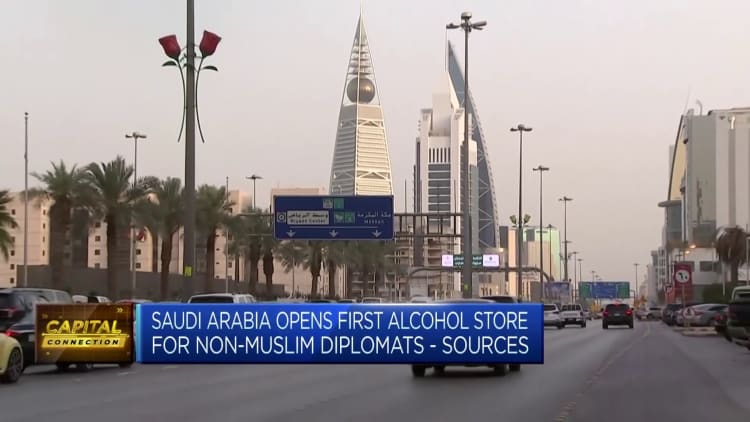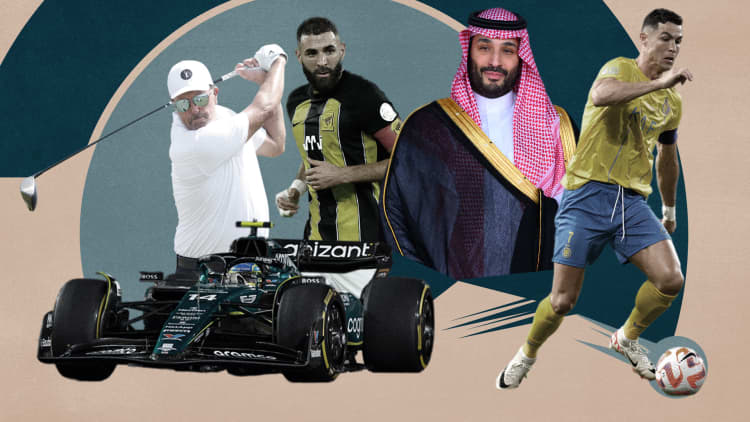
Saudi Arabia’s first alcohol shop has opened in the diplomatic district of its capital Riyadh, open to non-Muslim diplomats.
While it only affects a select group, it is a major change for the ultra-conservative Muslim kingdom, where alcohol has been banned since 1952 after a Saudi prince murdered a British diplomat in a drunken rage. Alcohol consumption is also forbidden in Islam and the majority of the population of Saudi Arabia is religious.
This hasn’t stopped alcohol from entering the kingdom over the years – it simply happened behind closed doors.
Foreign embassies can import alcohol under certain agreements with the Saudi government, while some embassies smuggle alcohol into the kingdom in secure “diplomatic bags” that cannot be inspected.
From there, the bottles are often sold on the black market at huge markups, say expatriates and locals of the country. Everyone who spoke to CNBC did so on condition of anonymity due to the sensitivity of the topic.
“Everyone knows which embassies sell alcohol… Some of them have turned it into a whole side business, selling it on the black market at four, five or even 10 times the normal price. This has become ridiculous. The government had to do something,” a Saudi investor based between Dubai in the United Arab Emirates and Riyadh told CNBC.
A one-liter bottle of vodka, for example, typically costs between $500 and $600 on the black market, sources said, while a single bottle of Johnnie Walker Blue Label cost between $1,000 and $2,000. According to expats who have previously lived there, alcohol has also been produced at home in the kingdom for decades.
The Kingdom Tower, operated by Kingdom Holding Co., center, stands in the skyline above the King Fahd Highway in Riyadh, Saudi Arabia.
Simon Dawson | Bloomberg | Getty Images
The new store in Riyadh has strict rules: Entry and shopping permits must be validated through an app called Diplo and approved by the Saudi Ministry of Foreign Affairs, and purchases are subject to a monthly quota system per registered person.
The new tracked purchase system is intended to “solve the problem of smuggling that we have always had with diplomats,” a Saudi adviser said. Another Saudi business owner based in the kingdom’s eastern Khobar region told CNBC: “The government has learned that a lot of alcohol from the amounts allowed for embassies is entering the black market. … Now this app is being rolled out wherever it will get its allotted amount with monitoring from a central location.

In fact, the Saudi government confirmed that regulating alcohol quotas for diplomatic missions was introduced to “counter the illegal trade in alcohol products,” the country’s Center for International Communications said in a statement quoted by CNN.
The Saudi Foreign Ministry and CIC did not respond to CNBC’s requests for comment.
Expats have often gone to great lengths to bring alcohol into the arid kingdom; A former British diplomat said he received whiskey bottles stored in an imported wing, while another described the moment a company shipping his furniture told him: “Sir, your couch is leaking.”
Saudi Arabia imposes severe penalties on those caught drinking or selling alcohol, from fines or lashings to deportation and prison sentences.
Read more CNBC news on Saudi Arabia
Still, many in the kingdom say legalizing alcohol consumption outside diplomatic venues is only a matter of time, although it will likely be limited to hotels or special economic zones and remain off-limits to Muslims. Several high-end restaurants in Riyadh and Jeddah already have full bars currently preparing elaborate non-alcoholic mocktails.
Saudi Arabia has undergone tremendous social and economic change in the years since the rise to power of the young Crown Prince Mohammed bin Salman, now the kingdom’s de facto ruler.
His Vision 2030 campaign is a multi-trillion-dollar project to reshape the Gulf state’s image, attract tourism and diversify its economy away from oil. It also aims to create new jobs for the booming Saudi youth population, 70% of whom are under 30 years old.
Read more about CNBC’s politics coverage
The kingdom has seen a series of liberalizing reforms since Crown Prince Mohammed came to power, allowing previously banned things such as women’s driving, cinemas and music festivals.
But alcohol has always been a taboo subject in Saudi Arabia – while the country’s leadership wants to modernize alcoholism and attract more tourism and foreign investors, it also needs to avoid alienating the local population, most of whom are deeply religious.
Source link
2024-01-29 02:16:53
www.cnbc.com






